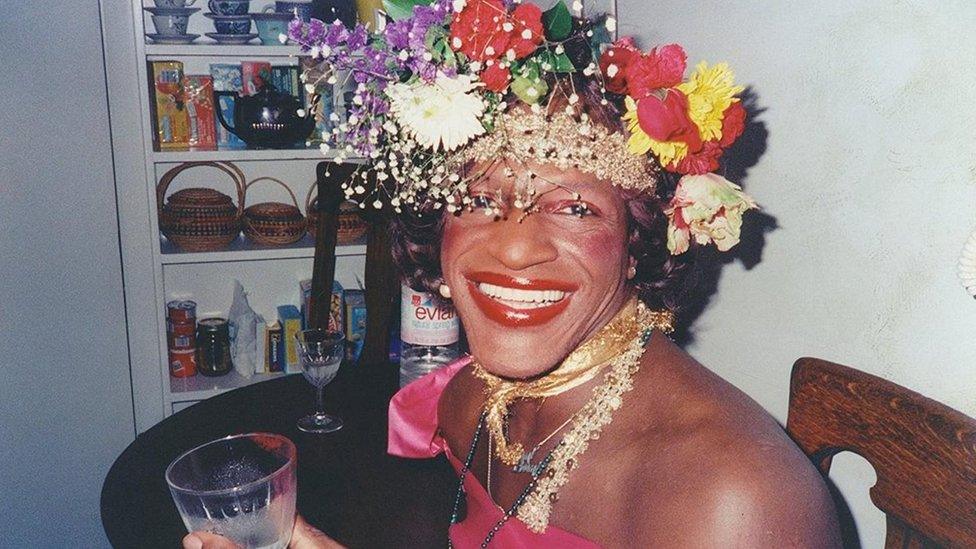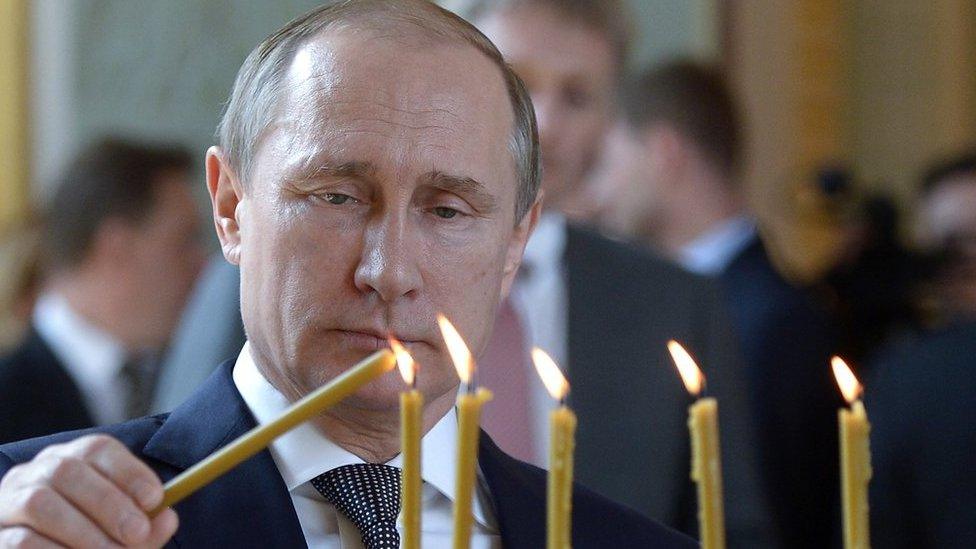Who's 'allowed' to tell a black trans woman's story?
- Published

While Marsha P Johnson may not be a household name, a fiery digital debate has started about who is "allowed" to bring her story to the screen.
Johnson was a black transgender woman and outspoken advocate for transgender rights in the 1960s. Most famously, she was a key participant in the 1969 Stonewall riots in New York City. Many see those events, which broke out after a police raid at the Stonewall Inn, a prominent gay bar, as the start of the gay rights movement in the United States.
Johnson's story is the subject of a new Netflix documentary by David France, an established filmmaker who's also gay and white. But France is not the only one who's been looking into the story. Reina Gossett, a black transgender filmmaker, claimed in an Instagram post, external that France's film used her research without permission. He has vehemently denied these allegations, external.
Gossett's post received thousands of likes and shares on social media, sparking a wider debate, with many arguing that France should not have made a film about Johnson - or at least that he should have backed Gossett's efforts to bring the story to light.
What happened to Marsha P Johnson?
Johnson is receiving a small flurry of attention right now, but in the early 1970s, some in the LGBT (lesbian, gay, bisexual, transgender) community tried to distance themselves from Johnson and other transgender and drag queen activists.
In 1992, Johnson went missing and her body was found six days later in the Hudson River. Police at the time called it a suicide, a ruling which many in the community disputed - citing high levels of violence against transgender women.
Gossett and France have approached telling Marsha P Johnson's largely forgotten history in very different ways.
Gossett is working with filmmaker Sasha Wortzel on "Happy Birthday Marsha", a fictionalised short film on the hours leading up to the Stonewall riots. Whereas France's "The Death and Life of Marsha P Johnson" is a documentary following trans activist Victoria Cruz as she investigates the circumstances of Johnson's death.
However, some on social media have argued France should have stepped aside and let Gossett, a member of the trans community, tell Johnson's story.
Allow X content?
This article contains content provided by X. We ask for your permission before anything is loaded, as they may be using cookies and other technologies. You may want to read X’s cookie policy, external and privacy policy, external before accepting. To view this content choose ‘accept and continue’.
Allow X content?
This article contains content provided by X. We ask for your permission before anything is loaded, as they may be using cookies and other technologies. You may want to read X’s cookie policy, external and privacy policy, external before accepting. To view this content choose ‘accept and continue’.
Others, though, were happy that an Oscar-nominated director had brought Johnson's story to a mainstream audience.
Allow X content?
This article contains content provided by X. We ask for your permission before anything is loaded, as they may be using cookies and other technologies. You may want to read X’s cookie policy, external and privacy policy, external before accepting. To view this content choose ‘accept and continue’.
Allow X content?
This article contains content provided by X. We ask for your permission before anything is loaded, as they may be using cookies and other technologies. You may want to read X’s cookie policy, external and privacy policy, external before accepting. To view this content choose ‘accept and continue’.
Lourdes Hunter, founder of the Trans Women of Color Collective, a grassroots organisation based in Washington DC, described France's documentary as "compelling," but felt that France should have used his position as an established filmmaker and a white man to promote the work of those in the black trans community.
"Stories about black trans women should be told by black trans women," she tells BBC Trending.
Hunter added that France's proclaimed support of Gossett's film is not enough.
"People who have access to resources, have access to social capital, access to finances, their role in the movement is to leverage their access so that the people who are supposed to be telling these stories... who are actually living these lives, [their] voices can be elevated."

You might also be interested in:

France, however, said he felt creating this documentary was a way of atoning for some of his community's past mistakes. His production company gave money to Gossett and Wortzel, and he says he supported their project independently of his own film.
"For me to not go back, for me to not revisit that story about which I knew so much already, would align me with the people who were eliminating their narrative from our history," France says, adding that the stories of historically important figures belong to all of humanity.
Gossett did not respond to BBC Trending's questions, but recently expanded on her initial post.
"As France's documentary starts to make its way to large audiences, I can't stop thinking about the voices that have been pushed aside in the process," she wrote in an article for Teen Vogue, external.
"Too often, people with resources who already have a platform become the ones to tell the stories of those at the margins rather than people who themselves belong to these communities." The feminist site Jezebel has since published a comprehensive rebuttal, external to Gossett's initial allegations.
France's documentary has received positive reviews from the mainstream media. According to Gossett, her film is still scheduled to premiere next year. But the online debate continues around who has the right to tell Marsha P Johnson's story.
Blog by Elizabeth Cassin and Ritu Prasad
Next story: Happy bot-day, Mr President

When President Vladimir Putin turned 65 on 7 October, he was not short of online well-wishers. But how many were real? READ MORE
You can follow BBC Trending on Twitter @BBCtrending, external, and find us on Facebook, external. All our stories are at bbc.com/trending.